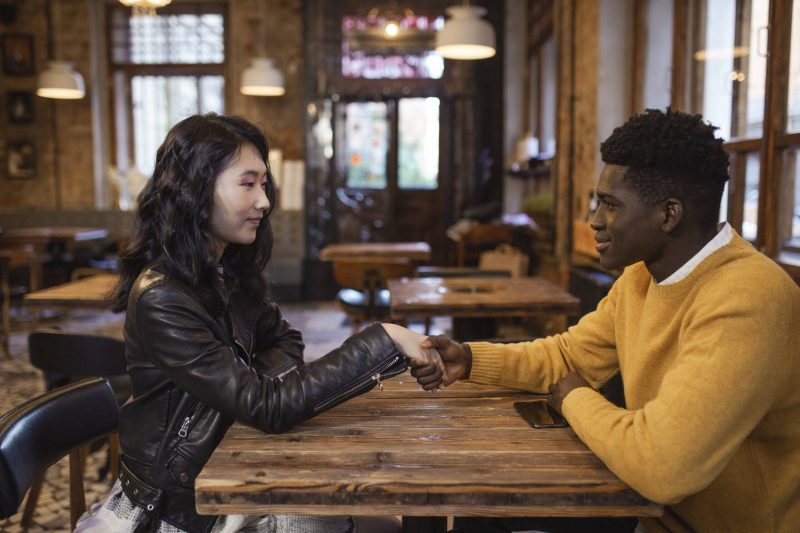Optimal Duration of First Dates
To determine the best duration for your first date with someone, consider the many factors at play. In this section on the optimal duration of first dates, we’ll delve into the ideal length of first dates. We will also examine the factors that can affect the duration of your first date, as well as the disadvantages of both short and long first dates. Lastly, we’ll discuss common mistakes to avoid when deciding on the length of your first date.
Ideal Length of First Dates
The length of a first date between potential partners can vary. It should be long enough to make a connection but not too long to feel obligated. An open mind and realistic expectations are key to making it go smoothly.
Focus on being present and engaged. Don’t spend too much time on trivial topics. Communication styles, interests, and body language cues should all be taken into account.
Research suggests shorter meetings can lead to more successful subsequent ones. But the comfort level and progress can differ for each person.
Once, I had a four hour date with someone who seemed like the perfect match. We ended up losing interest because we ran out of things to talk about. This showed me how important pacing is.
If you want to avoid awkward silences or embarrassing moments, try to keep your first date short.
Factors Affecting the Duration of First Dates
Variables such as location, time of day, activity choice, chemistry and the individuals’ personalities influence the length of first dates. Longer dates let people discover more similarities, while shorter ones make it less awkward. Preferences differ from one person to the other. Some like quick meet-ups, others like to sit down for a meal or coffee. In addition, past experiences and cultural norms also affect the length.
Everybody has their own take on the duration. Some can bond well within an hour, while others may need multiple meetings to connect. In medieval times, women would bring honey cakes on first dates to show sweetness and to have something to eat if conversations went on for too long. Short first dates are like speed dating but without the same excitement or possibility to vanish suddenly.
Disadvantages of Short First Dates
Short first dates can bring about negative effects. They offer fewer chances to get to know each other and find common interests. This can lead to rushed conversations, inaccurate perceptions of compatibility, and unanswered questions.
It is important to consider individual circumstances – like availability and comfort levels – when deciding the duration of a first date. Extending the length or scheduling follow-up meetings may improve the chances of successful relationships. Doing activities together and finding common interests can also help make conversations more meaningful. Ultimately, taking time to prioritize longer and relaxed first dates is a wise decision. Long first dates are like marathons – except instead of running, you’re trying not to run out of things to say!
Disadvantages of Long First Dates
First dates can be thrilling yet daunting. Going beyond the ideal period may cause a few issues which can stain the mood and chances of a flourishing relationship.
Here’s why Long First Dates aren’t recommended:
- It may hinder honest and sincere communication.
- Leads to overthinking and misinterpretations.
- Mentally draining.
- Alcohol or food overindulgence can destroy first impressions.
Aside from these, it can also make things dull. When both parties run out of topics to talk about, one may start to meddle in unnecessary personal matters, which is detrimental in the long run.
Research by Georgia State University found that couples who spent lesser time on their first date usually ended up with better connections. This helps keep expectations low and encourages positive reactions to future dates.
Per Elite Daily’s dating columnist Amanda Chatel, it takes three months for people to decide if they’re ready to enter a romantic relationship. Going overboard with a six-course meal on the first date is like running a marathon without learning how to walk.
Common Mistakes When Deciding on the Length of First Dates
When figuring out a first date length, it’s crucial to watch out for mistakes. Here’s some things to keep in mind:
- Not considering both people’s comfort.
- Making the date too long and causing exhaustion.
- Assuming there should be an intimate follow-up.
- Ignoring time and location restrictions.
- Talking too much about yourself and not allowing dialogue.
Check out your partner before deciding on how long to go on a first date. It’s important to give enough time for conversations without getting too romantic or having high expectations. This could lead to unease and disinterest.
Stay communicative when deciding the length of a first date. Tune in to your partner’s wishes and needs. Better yet, leave ’em wanting more by limiting the time you spend together.
Remember, setting boundaries on a first date is like making a fence around your personal space. Keep out any unwelcome visitors.
Setting Boundaries on First Dates
To set boundaries on first dates with “How long should a first date last?” as the article title, consider the following sub-sections as a solution: the importance of setting boundaries on first dates, dos and don’ts of setting boundaries on first dates, and communicating your boundaries effectively. These sub-sections will help you establish healthy and respectful boundaries for your first dates.
Importance of Setting Boundaries on First Dates
On a first date, boundaries are key. It’s important to talk about personal limits, expectations and deal-breakers. This makes sure both people are comfortable with each other.
Plus, discuss physical touch, intimacy and personal space. Communication boundaries should be discussed too – like which methods to use and how fast to respond. You need to be assertive when communicating your preferences.
Setting boundaries demonstrates self-respect. It can even attract people who share similar values around respect and consent.
Establishing boundaries on a first date is like wearing a seatbelt. It may not seem needed, but it can save you from a crash.
Dos and Don’ts of Setting Boundaries on First Dates
Setting boundaries on a first date can be tricky. But it’s important to start off with clear expectations. Whether you’re just starting to date or have experience, there are some Dos and Don’ts of Setting Boundaries on First Dates.
- Do communicate your boundaries clearly and respectfully. This includes topics that are off-limits, and physical boundaries. Share your needs honestly.
- Don’t compromise your values or beliefs. If something doesn’t feel right, stand your ground and leave if needed.
- Do trust your intuition and look out for red flags. If your gut says something’s wrong, pay attention. It’s better to be safe.
Setting boundaries is an ongoing process. It requires communication and self-awareness. While these guidelines help, every situation is different. Boundaries don’t just mean physical safety. They include emotional and mental well-being too.
A study in the Journal of Social and Personal Relationships found that people who set clear boundaries had less stress and better relationships.
When in doubt, communication is key. But sometimes a blunt object works too.
Communicating Your Boundaries Effectively
When it comes to setting boundaries on first dates, effective communication is key. Using assertive communication is a good way to make your expectations known, in a respectful manner. Body language can also be used – crossing arms or leaning away can show discomfort. Knowing what your boundaries are is important – take time to think about what you’re comfortable with. To make it easier, consider bringing up boundary-setting early on – this can prevent misunderstandings. Remember to actively listen to your date’s needs, and respect their boundaries too.
“I never understood why people go on hikes for first dates! Nothing like sweating and struggling to breathe.”
Activities to Do on a First Date
To plan the perfect first date with the appropriate activity for the occasion, explore this section on activities to do on a first date with sub-sections such as best activities for short and long dates, creative date ideas, and how to choose an appropriate activity. Find the best solution for your first date by navigating through each sub-section.
Best Activities for Short First Dates
Finding the right thing to do on a first date can be tricky. Thankfully, there are lots of options for quick first dates. Here are five ideas that make for great brief encounters:
- Sipping a cup of coffee at a café.
- Walking through a park.
- Browsing a bookstore or record shop.
- Trying a food truck or street vendor.
- Visiting an exhibit at a museum or art gallery.
When planning your short first date, remember it’s not about how long it lasts, but about making sure it’s enjoyable. Think of something quirky or special that leaves a lasting impression.
Pro Tip: Spend money wisely and pick a place where both of you can shine and connect.
Best Activities for Long First Dates
Searching for a special first date? Here are some ideas to create lasting impressions:
- Take a romantic nature walk or hike.
- Visit an art museum or join a painting class.
- Wine tasting or explore a new restaurant.
- Attend a concert or a live performance of your fave artist.
- Enjoy outdoor sports like kayaking, biking, or horseback riding.
- Check out local events and festivals with star-gazing sessions.
Fun Fact: Italian and Japanese cuisines are the top choices for couples on their first date night, according to Yelp’s data analysis!
For the daring duo – why not make a mosaic of your ex’s face together?
Creative Date Ideas for First Dates
Coming up with creative ideas for a first date can be both exciting and nerve-wracking. You want to make a good impression, but also do something new and fun. Here are some unique suggestions:
- Take a cooking class
- Go for a hike or bike ride in nature
- Visit an art museum/gallery
- Create something e.g. pottery or painting
- Attend a concert or music festival
- Try an escape room experience
Make sure you tailor the activity to your interests. For example, if you both like music, a concert is a great idea. If you love nature, hiking could be perfect.
For even better first-date ideas, consider comedy clubs, horseback riding, or water sports such as kayaking/jet skiing.
These activities are great because they give you the chance to connect and share interests. This helps create special memories on your first date, and sets the stage for future dates. Make the wrong choice, and you might find yourself awkwardly sipping lukewarm coffee together.
Choosing the Appropriate Activity for the Occasion
Plotting a first date needs careful thought. Here are some tips to make it perfect:
- Check out your mutual interests.
- Be conscious of the other person’s likes and dislikes.
- Take note of the time and place of the date.
- Opt for something that lets you talk but has fun stuff to do.
- Avoid movies and gigs, which don’t give much scope for interaction.
Outdoor activities, such as trekking or a park stroll, can be more exciting than indoor ones. Plan something that will remain in your memories after the date.
Remember that first dates are a chance to leave a good impression. Don’t let fear stop you from experimenting – take a chance and have a blast! Or else, you may miss out on a great bond with someone special.
Figuring out your date’s behavior is like solving a Rubik’s Cube – difficult, annoying, and often you just want to chuck it away.
Understanding Your Date’s Behavior on a First Date
To understand your date’s behavior on a first date with the article ‘How long should a first date last?’, consider examining their body language cues, common behavioral patterns, signs that indicate a date is not going well, and signs that indicate a date is going well. By analyzing these sub-sections, you’ll gain insight into your date’s persona, and whether the first date is worth seeing them again.
Body Language Cues on a First Date
Body language is a key part of communication, especially when it comes to first dates. Non-verbal signs like posture, gestures, facial expressions, and eye contact can tell us a lot about someone’s personality and feelings.
For example:
- Crossed arms mean defensiveness or unease.
- Leaning forward shows interest.
- Frequent glances at the phone mean lack of focus.
But, things like culture, personality traits, and context can change how body language is interpreted. So, when on a first date, keep an open mind. Body language cues may not always be true reflections of the other person.
It’s important to note non-verbal signals when getting to know someone. While they can’t guarantee a successful relationship, they can be helpful in addition to verbal communication.
Research has found that men tend to adopt more open body postures on dates than women (Journal of Nonverbal Behavior). So, rather than saying ‘let’s split the bill’, why not say ‘I had a terrible time and don’t want to owe you anything’?
Common Behavioral Patterns on a First Date
A first date can be nerve-wracking. Common behaviors can help ease the tension. Look out for signs like fidgeting or avoiding eye contact. Lean towards them, if they do the same – it’s a sign of interest. Listen to their words and tone of voice.
Pay attention to if they are actively listening or interrupting. If more engaged with their phone – not a good sign. Everyone takes time to open up. Respect their boundaries – don’t pressure them.
Pro-Tip: Have fun and be yourself. Don’t overthink it!
Signs That Indicate That Your Date is Not Going Well
Time to End Your Date? Signs It’s Going Poorly.
Check your date for these signs:
- Little eye contact and phone checking.
- Short answers and no convo-starters.
- Negative talk and complaining.
- Silence with no attempts to break it.
- No interest in what you like.
If you spot any of these, it’s okay to end it. Listen to your gut.
Ignore any red flags! They may save you from future trouble.
Looks like your date is going as well as a poor parallel park.
Signs That Indicate That Your Date is Going Well
Gauging the success of a first date can be tricky. Here are some indicators that may suggest things are going well:
- Interest in conversation topics.
- Eye contact and engaged body language.
- Shared laughter and a similar sense of humour.
- Similar values and goals expressed.
- Physical touch such as subtle gestures or light touching.
- Agreement on future plans (if discussed).
Showing these signs means the date is going smoothly, with the two people feeling comfortable communicating and connecting.
However, each date is different and someone may be reserved or fake interest. According to a study by the University of Kansas, couples who touch during their first date tend to report higher levels of satisfaction in the relationship.
If the date was a disaster, it makes a great story for next time!
Conclusion and Final Thoughts
When analyzing factors, it is recommended to keep the first date between 1-3 hours, depending on the comfort level between the individuals. This provides enough time to connect, but not too much.
It’s important to engage in conversations and learn about each other’s interests, hobbies, and life goals. Ideally, the first date should involve activities such as taking a walk, attending an event, or having lunch to build intimacy.
However, it’s best not to exceed the recommended time frame to avoid exhaustion and decrease interest. At the same time, it’s also important not to cut short a good date.
Remember, quality time without distraction builds a strong foundation for future dates. Arriving on time/early and avoiding the use of phones sets the tone and shows respect.
Pro Tip:
- Arrive on time/early
- Avoid using your phone
Frequently Asked Questions
Q: How long should a first date last?
A: A first date should last anywhere from 1-2 hours.
Q: Is it okay for a first date to last longer than 2 hours?
A: It can be okay for a first date to last longer than 2 hours, but it depends on how well the date is going and if both people are comfortable with continuing the date.
Q: Should a first date ever be less than an hour?
A: It’s not recommended for a first date to be less than an hour because it doesn’t provide enough time to get to know the other person.
Q: What if I run out of things to talk about before the 1-2 hour mark?
A: If you run out of things to talk about, it’s okay to end the date early. It’s better to end the date on a positive note than to force conversation and make it uncomfortable for both parties.
Q: Can a first date be shorter than 1 hour if there are time constraints?
A: Yes, if there are time constraints, it’s understandable for a first date to be shorter than an hour. But it’s still important to make the most of the time you have together.
Q: Should I plan something for after the first date?
A: It’s up to you if you want to plan something for after the first date. It can be a good way to continue the conversation and see if there’s potential for a second date.
{
“@context”: “https://schema.org”,
“@type”: “FAQPage”,
“mainEntity”: [
{
“@type”: “Question”,
“name”: “How long should a first date last?”,
“acceptedAnswer”: {
“@type”: “Answer”,
“text”: “A first date should last anywhere from 1-2 hours.”
}
},
{
“@type”: “Question”,
“name”: “Is it okay for a first date to last longer than 2 hours?”,
“acceptedAnswer”: {
“@type”: “Answer”,
“text”: “It can be okay for a first date to last longer than 2 hours, but it depends on how well the date is going and if both people are comfortable with continuing the date.”
}
},
{
“@type”: “Question”,
“name”: “Should a first date ever be less than an hour?”,
“acceptedAnswer”: {
“@type”: “Answer”,
“text”: “It’s not recommended for a first date to be less than an hour because it doesn’t provide enough time to get to know the other person.”
}
},
{
“@type”: “Question”,
“name”: “What if I run out of things to talk about before the 1-2 hour mark?”,
“acceptedAnswer”: {
“@type”: “Answer”,
“text”: “If you run out of things to talk about, it’s okay to end the date early. It’s better to end the date on a positive note than to force conversation and make it uncomfortable for both parties.”
}
},
{
“@type”: “Question”,
“name”: “Can a first date be shorter than 1 hour if there are time constraints?”,
“acceptedAnswer”: {
“@type”: “Answer”,
“text”: “Yes, if there are time constraints, it’s understandable for a first date to be shorter than an hour. But it’s still important to make the most of the time you have together.”
}
},
{
“@type”: “Question”,
“name”: “Should I plan something for after the first date?”,
“acceptedAnswer”: {
“@type”: “Answer”,
“text”: “It’s up to you if you want to plan something for after the first date. It can be a good way to continue the conversation and see if there’s potential for a second date.”
}
}
]
}









